Coronary Angioplasty Procedure in Nagpur
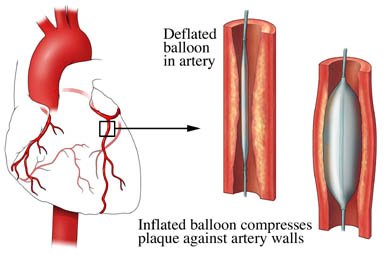
Coronary angioplasty is a minimally invasive technique of abdominal artery angioplasty, which is used to treat coronary arteries that are obstructed or constricted and it is the most appropriate technique used by doctors for the treatment. In simple words, A treatment for the enlargement and opening of narrowed or blocked arteries which supply your heart muscle is coronary angioplasty and stenting.
Procedure of Angioplasty
The Coronary Angioplasty procedure done in various process:
Access:
Access artery, insert catheter in groin/wrist, apply anesthetic for comfort. Treats blockages/narrowing in arteries.
Imaging and Evaluation:
A contrast dye is injected through the catheter, and X-ray imaging is used to visualize the coronary arteries. This helps the cardiologist identify the location and severity of the blockage.
Balloon Inflation:
Balloon-tipped catheter advances to blockage, inflates, widening artery, restoring blood flow by pressing plaque against walls.
Stent Placement (if necessary):
Stent inserted after balloon inflation keeps the artery open, a wire mesh tube locks in place and pushes plaque.
Recovery:
Angioplasty’s crucial aspect is recovery, monitoring the patient’s ability to resume daily activities. Cardiac rehab can aid healing.
Why It’s Done ?
A medical procedure for the repair of restricted or obstructed blood vessels is angioplasties, also known as balloon angioplasty and coronary Angioplasty. It’s about placing a catheter in the artery and using it to draw your guide wire towards the site of injury. The narrowed segment is then advanced and inflated with a specialized balloon catheter, which forces the plaque or blockage against the arterial walls to widen the conduit and improve blood flow.
Benefits
1. Minimally invasive procedure with smaller incisions and reduced recovery time.
2. Immediate relief from angina symptoms and reduces the risk of heart attack by opening blocked arteries and preventing blood clots.
3. Long-term benefits, including stabilization of coronary artery disease and potential life expectancy improvement.
Risks Involved
Coronary angioplasty treatment carries risks: artery damage, bleeding, blood clots, infection, and allergic reactions to dye. Restenosis can occur, and rare cases may have heart attack, stroke, or cardiac perforation. Monitoring and quick medical attention can help reduce risks.
Types of Angioplasty
There are also other several types of angioplasty test procedures based on the targeted vessels:
Peripheral Angioplasty
Treats narrowed arteries in the legs, arms, and other peripheral areas.
Carotid Angioplasty
Addresses stenosis in the carotid arteries, reducing the risk of stroke.
Renal Angioplasty
Dilates narrowed arteries in the kidneys to improve kidney function.
Balloon Angioplasty
Utilizes a balloon catheter to widen the narrowed artery.
What is done after the procedure of Angioplasty?
All patients are carefully followed after angioplasties for any complications. The use of medicinal products to treat the pain and avoid blood clots is recommended. Care instructions, including wound care, medication management and lifestyle changes are given to patients after the angioplasty process. Follow-up appointments are scheduled to assess progress and ensure ongoing care.
In Nagpur, coronary angioplasty is a widely available and advanced medical procedure used to treat blocked coronary arteries. Skilled cardiologists perform the minimally invasive technique, which involves inserting a balloon or stent to open narrowed arteries, restoring blood flow to the heart, and improving patients’ cardiac health. And the Coronary Angioplasty cost in Nagpur is very efficient. Dr. Chetan Rathi is one of the Heart Specialists who perform Coronary Angioplasty in Nagpur.
Our Medical Services

ECG
An electrocardiogram (ECG) is one of the only and speediest tests utilized to survey the heart. Anodes (small, plastic patches that stick to the skin) are set at certain spots on the chest, arms, and legs.
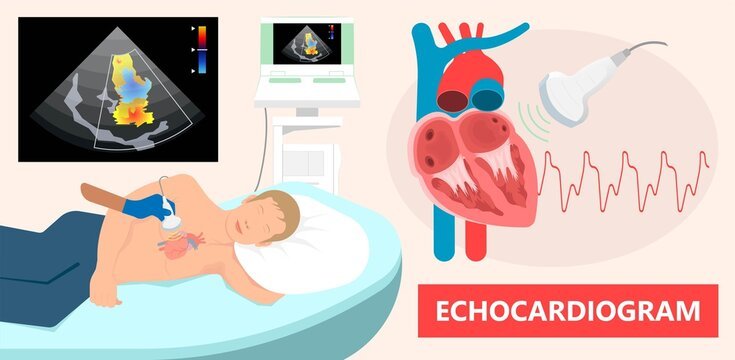
2D Echo
A two-dimensional Echocardiogram or 2D Echo test is a demonstrative test that employs ultrasound waves to evaluate the working of the heart.

Holter Monitoring
Holter monitoring measures your heart activity over an extended period, usually between 24 and 48 hours. Basically, a Holter Monitoring is a portable device which records the heart’s electrical signals.

BP Monitoring
Each time your heart beats, it pumps blood into your arteries. A blood pressure measurement may be a test that measures the force (pressure) in your arteries as your heart pumps.

Coronary Angiography
Coronary angiography diagnoses and evaluates coronary artery blockages. Contrast dye is injected into arteries, enabling X-ray imaging to visualize blood flow and identify narrowing or blockages.

Best Cardiologist in Nagpur
Introducing Dr. Chetan Rathi, a distinguished Cardiologist in Nagpur, whose eminence transcends the realm of medical proficiency.
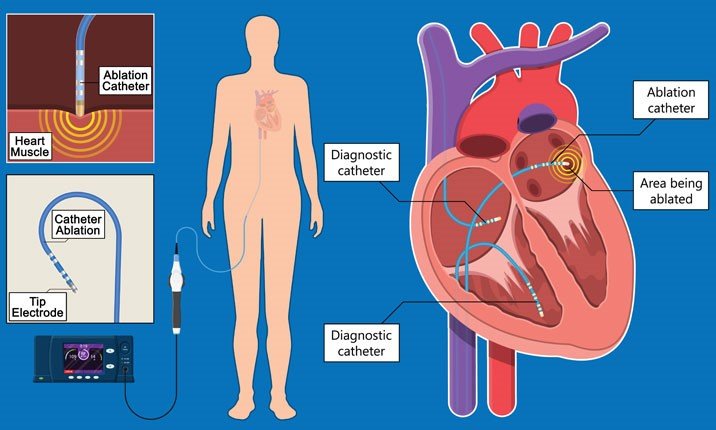
Electrophysiology Study
An Electrophysiology Study (EP study) is a test utilized to assess the heart’s electrical framework and check for abnormal heart rhythms. The natural electrical impulses coordinate the contractions of different parts of the heart.
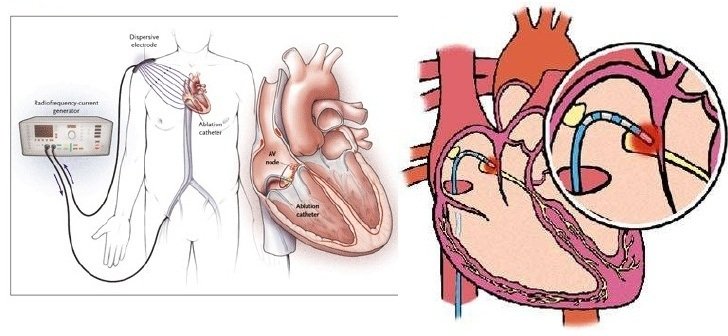
Radiofrequency Ablation
Radiofrequency Ablation (RFA) is a minimally invasive medical procedure that uses high-frequency electrical currents to generate heat, effectively destroying abnormal tissue or cells.
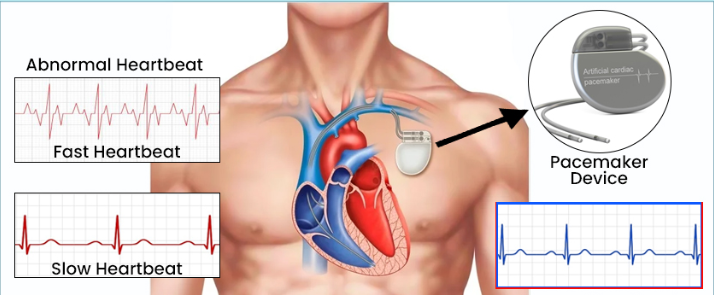
Pacemaker Implantation
Pacemakers are medical devices designed to support and regulate the electrical system of the heart, ensuring it functions properly. This medical procedure entails the insertion of a small device into the chest region.

ICD Implantation
An Implantable Cardioverter-Defibrillator (ICD) is a life-saving device that plays a crucial role in monitoring and regulating heart rhythms. It consists of a pulse generator and leads implanted in the heart.

CRT_P & CRT-D Implantation
CRT implantation is a process in which technological instruments known as CRT-P and CRT-D where p stands for pacemaker and d stands for defibrillator.

Valvuloplasty
A balloon mitral valvuloplasty is a process to extend a restricted heart valve and improve blood flow. The heart valves handle how blood drives through the heart.
Our Achievements in Numbers
Happy Patients
Years of experience
Specialisations
Hospital Associations
Awards & Recognition
Patient Testimonials
Dr Chetan Rathi sir is good cardiologist. I visited him many times with my family and friends for consult about issues related with cardiology.
Our Videos




Our Blog
 How Does Vitamin D Affect Your Heart?
How Does Vitamin D Affect Your Heart?
Vitamin D is much more than the “sunshine vitamin”; it is very important in the whole body of heart health. It works from bone health to an enhanced immunity function. Scientific studies show that this regulates cardiovascular health; therefore, it is a very great factor in preventing heart diseases and maintaining optimal heart function. This… Continue reading How Does Vitamin D Affect Your Heart?
Read More Understanding Diabetes: Causes, Symptoms, and Management
Understanding Diabetes: Causes, Symptoms, and Management
Diabetes mellitus is a chronic condition that affects the way your body processes glucose, or sugar. Unchecked, diabetes mellitus can lead to serious complications, such as heart disease and kidney damage, as well as nerve problems. Understanding the types of diabetes, the symptoms of diabetes, the causes of diabetes, and how to take care of… Continue reading Understanding Diabetes: Causes, Symptoms, and Management
Read More What Is Syncope and How Can It Be Prevented and Treated?
What Is Syncope and How Can It Be Prevented and Treated?
Syncope, also known as fainting, is a short-lived loss of consciousness which primarily results from a sudden decrease in blood flow to the brain. Although fainting can be alarming, syncope is generally not a serious condition and can be caused by a variety of reasons; however, it may indicate an underlying serious medical condition in… Continue reading What Is Syncope and How Can It Be Prevented and Treated?
Read More



